
Ahhh, caffeine…the most widely consumed psychoactive substance in the world, and coffee…possibly the most controversial beverage containing it. Depending on who you ask, drinking 2-3 cups a day has numerous health benefits, or it’s totally unhealthy and addictive. I actually have an unbiased view, so what you choose to do with your brew is totally up to you.
If you absolutely cannot live without your coffee, we’ll take a look at some tricks you can do to make it easier on your system. And if you decide you would like to try some healthy alternatives to coffee to get your caffeine fix, we’ll look at those too.
Me…I enjoy a good cup of java every now and again. I can’t drink it everyday though, not because I hate on coffee…but because coffee on hates me. Most people can wake up and head straight for their coffee first thing in the morning. Not me. When I’m in the mood for coffee, I can’t just grab a cup, there are things I have to do before I can even attempt a cup, like get some protein in my stomach…STAT.
So, for all my caffeine sensitive peeps out there…I feel you. I am super sensitive to the stimulant and acidic effects of coffee…to the point of serious nausea. And trust me, the whole “you’re sooo lucky” thing…nope…being on the verge of losing your cookies…not such a lucky feeling at all.
Besides the blissful aroma and robust taste of coffee, the obvious thing that most of us are after is the nice strong shot of energy from caffeine. And no doubt, coffee delivers in a huge way, but how about those jitters! So for those seeking that caffeine boost, the next best thing seems to be trusty tea, right? Maybe you’ve heard that tea is a healthier and better buzz than coffee. But is it really the case?
Let’s find out…
Coffee Buzz vs Tea Buzz
Both coffee and tea have a stimulant effect on the brain fueled by caffeine, but the nature of the psychoactive effects of each is quite different.
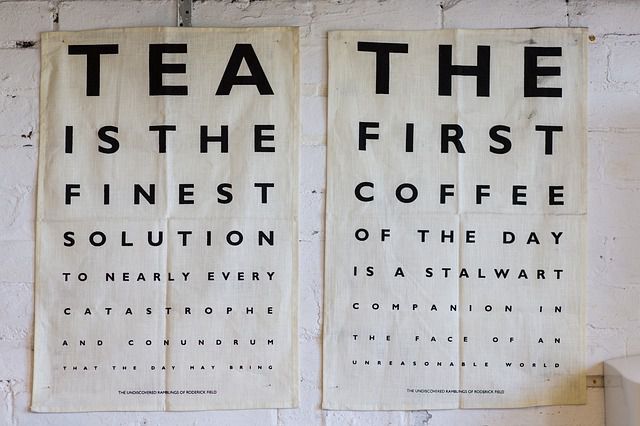
The super fast jolt of energy from coffee can be short lived, and cause a “wired” feeling that causes your brain to wander, which can ultimately have you “spinning your wheels” on unproductive tasks. This short burst of energy is typically followed by an energy crash leaving you feeling sluggish and possibly moody, which has many people reaching for another cup of Joe, and another, and another…
Tea provides a more gentle, stable and sustained energy. It provides you with a calmer energy and alertness so that you can focus on productive tasks, and get more done without crashing afterwards. So, what constitutes the different effects of these two stimulants?
The fact that coffee contains more caffeine than tea, approximately one-third to one-half more per cup, may seem to explain the differences, but there’s actually more to it. Tea contains three additional components; theobromine and theophylline, which positively affect moods and alertness, and L-theanine, which increases alpha waves associated with alert relaxation and may also affect neurotransmitters such as GABA and dopamine which make you feel good. L-theanine works with caffeine in tea to generate a milder buzz than coffee, and can also improve attention and brain function at the same time.
It’s also interesting to note that the effects of theobromine can last almost twice as long as the effects of caffeine, so although the energy from coffee kicks in almost immediately, the buzz may last only about half as long as the nice clear buzz that tea and other alternatives can give you.
Upsides and Downsides of Coffee
I believe that coffee has upsides and downsides. Coffee contains antioxidants and other nutrients including, B vitamins, potassium and magnesium. Upsides can include things like improvement in energy levels, mood and various brain functions, increased metabolism and fat burning ability, improvement in physical performance, and decreased risk of Alzheimer’s and dementia, to name a few.
Some downsides to coffee include, increased acid production which can cause stomach/digestive issues, contribute to heartburn/acid reflux and impede calcium absorption, taxed adrenal glands, sleeplessness, central nervous system issues such as anxiety, jitters, nervousness, irritability, headaches and drowsiness, dependency to stay regular, and increased thirst and dehydration, to name a few.
Possibly the biggest downsides to coffee are the dependence and tolerance factors. Obviously the more coffee you drink, the more you can tolerate, which is why regular caffeine drinkers develop caffeine de-sensitization and need more and more to reach the level of “high” you got the first time. And if you stop drinking it once your body has built up this tolerance, you get withdrawal symptoms such as the headaches, irritability, moodiness, and the “shakes”.

And while black coffee may boost your metabolism, the bitter sweet truth is…it’s a far cry from the milk, sugar, sugary flavored creamers and syrups, and whipped cream that most people love in their coffee. Just one coffee from your favorite coffee shop can have over 500 calories and that’s not even breaking down fat, sugar, and sodium content. Drink two, or even a few of these per day and that’s an awful lot of empty calories that can pack on extra pounds lickety-split!
This infographic is a great example of how many calories are in popular Starbucks beverages (and yes, green tea latte even made the list…just goes to show, it’s easy to muck up anything with a bunch of unhealthy fat and sugar).
Healthier Alternatives for Your Caffeine Fix
So if any of that is enough to make you want to get your caffeine fix elsewhere, or you’ve already been wanting to kick your coffee habit, here are some alternatives worth trying…
Matcha Green Tea
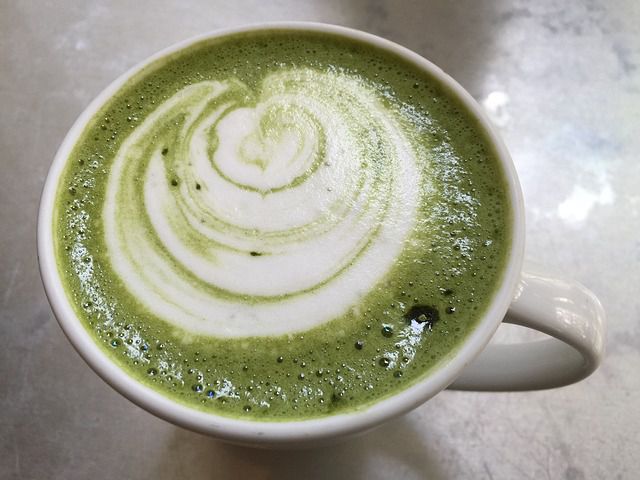
A beverage rooted in ancient Japanese culture, matcha contains caffeine, theobromine, theophylline, and L-theanine and is the perfect beverage for clear, sustainable energy and mental focus. It’s an antioxidant powerhouse with over 60 percent of catechins being EPCg – potent anti-cancer components. It can aid in detoxification, boost metabolic rate, stabilize blood sugar, promote longevity, and much more.
Matcha contains approximately ten times the nutritional content of regular brewed green tea. It’s rich, earthy, or grassy taste, is stronger than regular brewed green tea, so the taste may take a little getting used to, but I love a good cup of plain matcha. Of course if you like it sweeter, you can just add a little honey. Other ways to enjoy matcha include adding low calorie flavored almond milk or coconut milk creamer, or making a matcha latte (hot or cold) with unsweetened almond or coconut milk and honey.
Yerba Mate
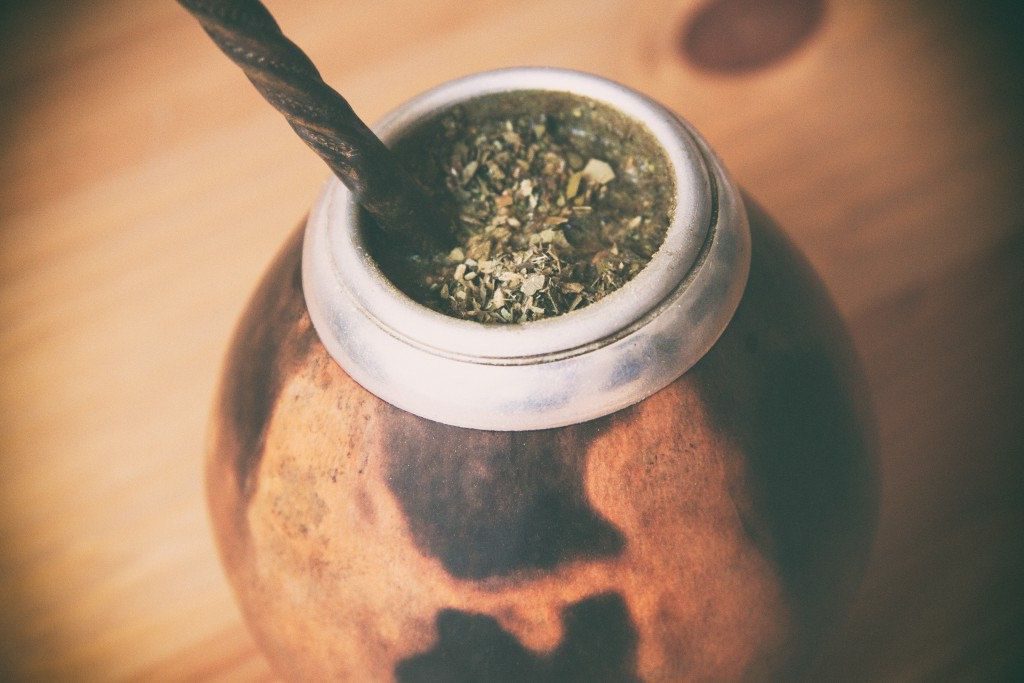
A traditional South American brew, sipped from a gourd and bombilla for rejuvenation, invigoration, focus and nourishment, yerba mate contains caffeine, theobromine, and theophylline. Mate is abundant in vitamins and minerals, amino acids, and antioxidants. It’s caffeine content varies somewhere between that of coffee and tea. It has a low tannin content, so it can be made strong like coffee but it tastes less bitter than tea, is less acidic than coffee, and provides a gentle, clean and calm energy…minus the jitters.
Yerba mate also has a grassy taste that may take some getting used to. If you’ve never tried it, a good way to get introduced is to try Guayaki’s unsweetened bottled yerba mate like hibiscus lime, and then venture out to brewing the loose leaf. There are a variety of ways to prepare yerba mate, from a tea infuser, coffee machine, french press, or an expresso maker. It’s great hot or cold and serving it with unsweetened almond or coconut milk and honey, or lemon and mint are a few ways to enjoy tasty versions of mate.
Tea
This may seem redundant since matcha is already first on the list, but virtually all varieties of tea are a good substitute for coffee. Many coffee aficionados seem to be fans of the unique flavors found in oolong and pu-erh. When replacements for your caffeine in coffee are what you’re after, green or ginseng tea with ginger and honey, and black or chai tea with unsweetened almond or coconut milk and honey, or flavored almond or coconut milk creamers can make particularly satisfying replacements.
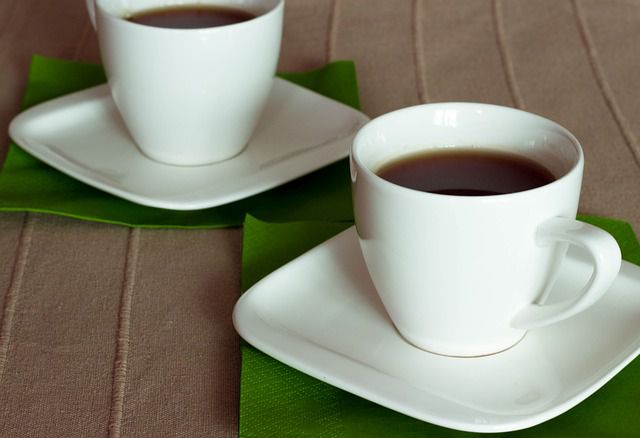
Cacao
Raw cacao (not cocoa), made from cacao beans found in pods from the cacao fruit tree, is chocolate in it’s rawest form (sans sugar), a rich source of antioxidants, flavonoids, magnesium, theobromine, essential fatty acids, and much more. A few of the benefits of cacao are possible improvement in heart health, cholesterol, and inflammation.
Cacao may also play a role in combating stress, by promoting feelings of relaxation, contentment, and euphoria, containing compounds which help to raise serotonin, our “feel good” hormone – which would explain our beloved relationship with blissful chocolate…it literally can make you feel blissful.
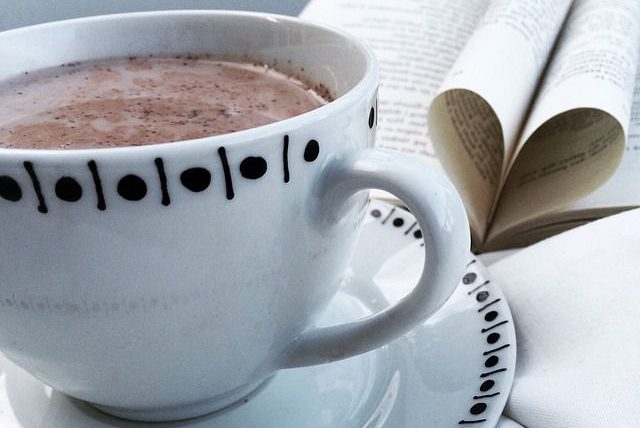
That said, I encourage you to do your research on this one so you can make an informed decision on whether or not cacao is for you, particularly if you plan on it as a daily alternative to coffee. Like coffee, cacao is also a controversial substance. Depending on who you ask it’s one of the most incredible superfoods on the planet, or toxic and addictive.
There was a brief period when I consumed it on a daily basis, but it just amped me up waayyyy too much and when I started finding it difficult to sleep, I decided it wasn’t the best thing for me to consume everyday – but remember, I’m sensitive to caffeine and stimulants. These days, I love the occasional cacao in smoothies and desserts, which I’ve found works great for me.
To enjoy cacao in place of coffee, simply whisk the powder, alternatively you can use a coffee grinder to grind cacao nibs into a powder (cacao nibs can contain a stronger roasted flavor and give you that bitterness that coffee gives) into water, a dairy alternative like unsweetened almond or coconut milk, or regular milk that has been brought to a boil.
- 1-2 tablespoons cacao powder
- 1 cup liquid
Enjoy it plain, or spice it up with vanilla bean, cinnamon, honey, orange zest, nutmeg, or chile powder for a nice little kick.
Some other yummy ways to enjoy cacao are in this healthy dark chocolate pudding and chocolate cherry chia pudding.
Each of these is a nice alternative to coffee but I’m not gonna lie…if your body relies on that morning cuppa’ Joe to get going, you’re not likely to feel the full effects of energy from these alternatives right away. BUT, once you get off the coffee completely…you will. It just takes a bit to reverse the de-sensitization to caffeine.
On the other hand, if drinking java is your thing, here are a few tweaks you can make to your coffee to help balance blood sugar, mitigate the effects of acid, and make it as gentle on your system as possible…
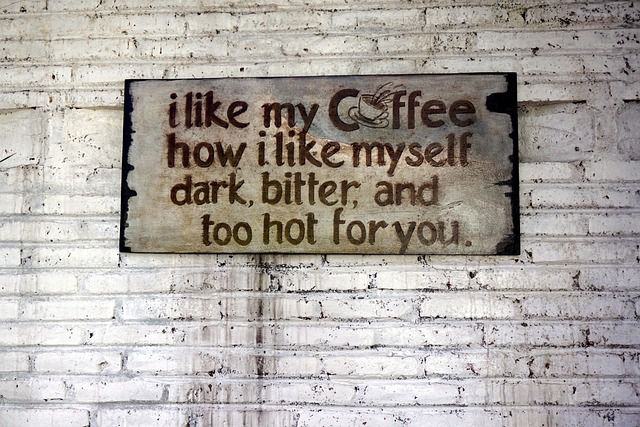
Tips to Make Your Coffee Healthier
- Eat foods with protein and healthy fats, and avoid sugar/carb laden foods with coffee
- Add protein from hydrolyzed collagen powder, plant or whey based protein powder to your coffee
- Add a tablespoon of coconut oil or some MCT oil
- Sprinkle in some cinnamon (a natural blood sugar regulator)
- Avoid processed sugars and artificial sweeteners (if you want something sweet, opt for honey instead)
- Skip the low-fat milk and artificial creamers. There are some delicious almond and coconut milk based creamers available now that will save you a ton of calories and sugars
- Drink good quality organic coffee since coffee beans are heavily sprayed with pesticides – coffee roasted over low heat decreases acidity, like this brand that is 70 percent less acidic and organic
- If you are a reuse kind of person, this one may be a bit tough, and I never even realized this until now, but apparently reusable metal filters don’t filter out oily cholesterol raising substances in coffee like paper filters do…more details here…
- This last one applies to all caffeine of course, not just coffee…it’s a good idea to avoid it after 2 pm, if you don’t want it to interrupt your sleep
Well, there’s enough information here to help you decide whether to continue on your java sipping journey, and some alternatives to try either way. Why not take the alternatives to coffee journey? I’m not saying it will be better than coffee, especially if that’s been your jive, but it will be awesome and very enjoyable.
What do you think? Love to hear the buzz!

I really liked this article. I myself was a coffee drinker on a daily basis. The tea really helped me to switch to a cleaner energy and it has also improved my moods. Now I have some matcha during the week and have a coffee over the weekend. Thanks for sharing.
Thanks James, happy you liked the post and thanks so much for sharing your personal experience making the switch from daily coffee to tea. And by you striking a good balance of tea during the week and coffee on the weekends, it just proves that you can successfully kick coffee dependence, yet still enjoy it occasionally, if you choose. Good for you =)